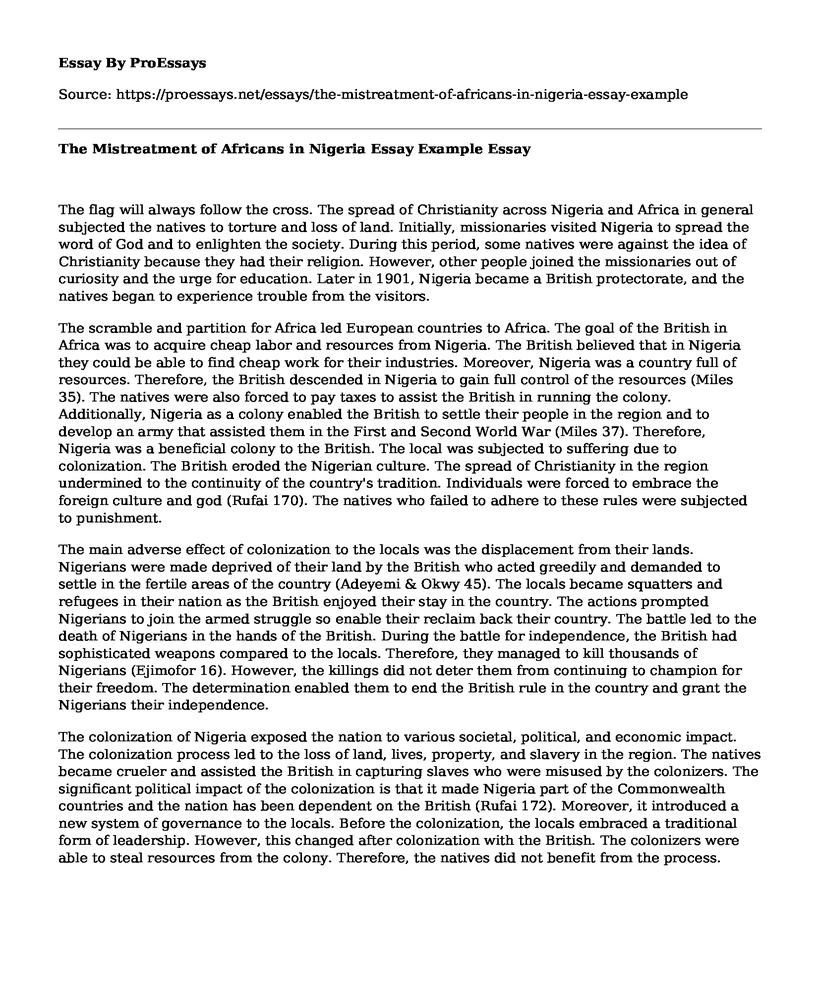The flag will always follow the cross. The spread of Christianity across Nigeria and Africa in general subjected the natives to torture and loss of land. Initially, missionaries visited Nigeria to spread the word of God and to enlighten the society. During this period, some natives were against the idea of Christianity because they had their religion. However, other people joined the missionaries out of curiosity and the urge for education. Later in 1901, Nigeria became a British protectorate, and the natives began to experience trouble from the visitors.
The scramble and partition for Africa led European countries to Africa. The goal of the British in Africa was to acquire cheap labor and resources from Nigeria. The British believed that in Nigeria they could be able to find cheap work for their industries. Moreover, Nigeria was a country full of resources. Therefore, the British descended in Nigeria to gain full control of the resources (Miles 35). The natives were also forced to pay taxes to assist the British in running the colony. Additionally, Nigeria as a colony enabled the British to settle their people in the region and to develop an army that assisted them in the First and Second World War (Miles 37). Therefore, Nigeria was a beneficial colony to the British. The local was subjected to suffering due to colonization. The British eroded the Nigerian culture. The spread of Christianity in the region undermined to the continuity of the country's tradition. Individuals were forced to embrace the foreign culture and god (Rufai 170). The natives who failed to adhere to these rules were subjected to punishment.
The main adverse effect of colonization to the locals was the displacement from their lands. Nigerians were made deprived of their land by the British who acted greedily and demanded to settle in the fertile areas of the country (Adeyemi & Okwy 45). The locals became squatters and refugees in their nation as the British enjoyed their stay in the country. The actions prompted Nigerians to join the armed struggle so enable their reclaim back their country. The battle led to the death of Nigerians in the hands of the British. During the battle for independence, the British had sophisticated weapons compared to the locals. Therefore, they managed to kill thousands of Nigerians (Ejimofor 16). However, the killings did not deter them from continuing to champion for their freedom. The determination enabled them to end the British rule in the country and grant the Nigerians their independence.
The colonization of Nigeria exposed the nation to various societal, political, and economic impact. The colonization process led to the loss of land, lives, property, and slavery in the region. The natives became crueler and assisted the British in capturing slaves who were misused by the colonizers. The significant political impact of the colonization is that it made Nigeria part of the Commonwealth countries and the nation has been dependent on the British (Rufai 172). Moreover, it introduced a new system of governance to the locals. Before the colonization, the locals embraced a traditional form of leadership. However, this changed after colonization with the British. The colonizers were able to steal resources from the colony. Therefore, the natives did not benefit from the process.
Conclusion
The British enjoyed all the benefits. Moreover, it led to the mismanagement of talents. The British were able to take slavery from Nigeria to provide them with cheap labor. The process led to suffering and deprived Nigeria, some resourceful individuals who could have steered their economy to success. Nigerians suffered in the hands of the British colonizers and this significantly affected their progress. People were killed, and land lost to the colonizers, and this is why Nigerians always celebrate their independence on October 1st of every year.
Works Cited
Adeyemi, Semiu Babatunde, and Okwy Okpala. "The impact of audit independence on financial reporting: Evidence from Nigeria." (2011).
Ejimofor, Cornelius Ogu. British colonial objectives and policies in Nigeria: the roots of conflict. Africana-Fep Publishers, 1987.
Miles, William FS. Hausaland Divided: Colonialism and independence in Nigeria and Niger. Cornell University Press, 2015.
Rufai, Saheed Ahmad. "The Interplay of Power and Religion in Nigeria from Colonization to Democratization." World Journal of Islamic History and Civilization 1.3 (2011): 168-177.
Cite this page
The Mistreatment of Africans in Nigeria Essay Example. (2022, Nov 06). Retrieved from https://proessays.net/essays/the-mistreatment-of-africans-in-nigeria-essay-example
If you are the original author of this essay and no longer wish to have it published on the ProEssays website, please click below to request its removal:
- Essay Example on The Life of Arnold Schoenberg: An Aussie-American Composer's Rise From Humble Beginnings
- Paper Example on Violence Exposure & Its Impact on Child Development
- Literary Analysis Essay on "Wide Sargasso Sea" and "A Room of One's Own"
- Essay Example on Alcohol Use: Contention Over Common Good in Catholic Context
- From Personal Choice to Public Health - Essay Sample
- Essay Example on Bullying of Disabled Children in Schools: Negative Impacts on Learning
- Essay Example on Why Does the Number of Sexual Assaults Continue to Increase Throughout Your Army?







